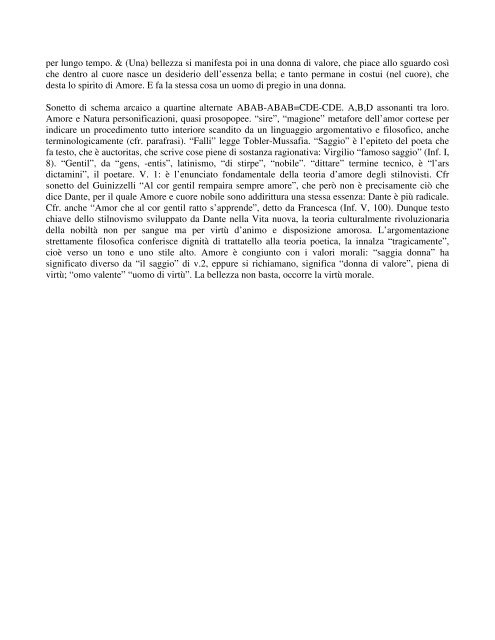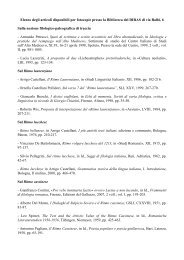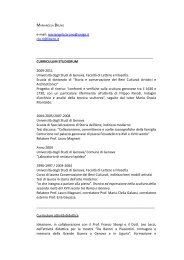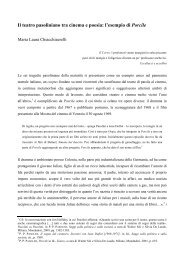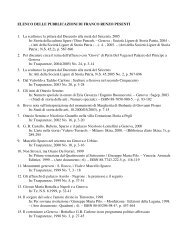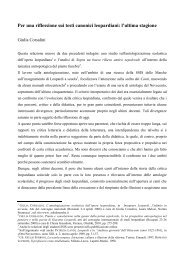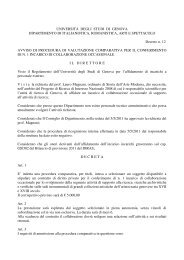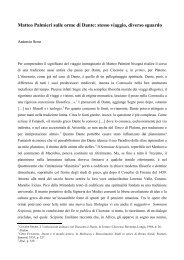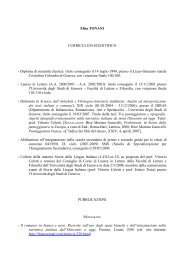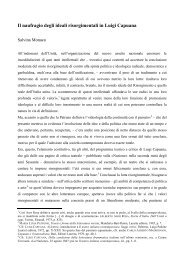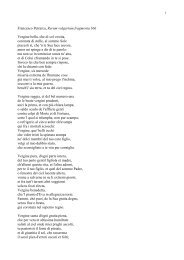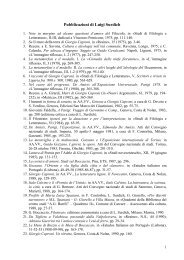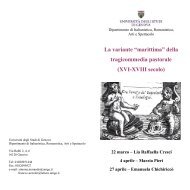Ne li occhi porta la mia donna Amore, per che si fa gentil ciò ... - Diras
Ne li occhi porta la mia donna Amore, per che si fa gentil ciò ... - Diras
Ne li occhi porta la mia donna Amore, per che si fa gentil ciò ... - Diras
You also want an ePaper? Increase the reach of your titles
YUMPU automatically turns print PDFs into web optimized ePapers that Google loves.
<strong>per</strong> lungo tempo. & (Una) bellezza <strong>si</strong> manifesta poi in una <strong>donna</strong> di valore, <strong>che</strong> piace allo sguardo così<br />
<strong>che</strong> dentro al cuore nasce un de<strong>si</strong>derio dell’essenza bel<strong>la</strong>; e tanto <strong>per</strong>mane in costui (nel cuore), <strong>che</strong><br />
desta lo spirito di <strong>Amore</strong>. E <strong>fa</strong> <strong>la</strong> stessa cosa un uomo di pregio in una <strong>donna</strong>.<br />
Sonetto di s<strong>che</strong>ma arcaico a quartine alternate ABAB-ABAB=CDE-CDE. A,B,D assonanti tra loro.<br />
<strong>Amore</strong> e Natura <strong>per</strong>sonificazioni, qua<strong>si</strong> prosopopee. “<strong>si</strong>re”, “magione” metafore dell’amor cortese <strong>per</strong><br />
indicare un procedimento tutto interiore scandito da un <strong>li</strong>nguaggio argomentativo e filosofico, an<strong>che</strong><br />
terminologicamente (cfr. parafra<strong>si</strong>). “Fal<strong>li</strong>” legge Tobler-Mussafia. “Saggio” è l’epiteto del poeta <strong>che</strong><br />
<strong>fa</strong> testo, <strong>che</strong> è auctoritas, <strong>che</strong> scrive cose piene di sostanza ragionativa: Virgi<strong>li</strong>o “<strong>fa</strong>moso saggio” (Inf. I,<br />
8). “Gentil”, da “gens, -entis”, <strong>la</strong>tinismo, “di stirpe”, “nobile”. “dittare” termine tecnico, è “l’ars<br />
dictamini”, il poetare. V. 1: è l’enunciato fondamentale del<strong>la</strong> teoria d’amore deg<strong>li</strong> stilnovisti. Cfr<br />
sonetto del Guinizzel<strong>li</strong> “Al cor <strong>gentil</strong> rempaira sempre amore”, <strong>che</strong> <strong>per</strong>ò non è precisamente ciò <strong>che</strong><br />
dice Dante, <strong>per</strong> il quale <strong>Amore</strong> e cuore nobile sono addirittura una stessa essenza: Dante è più radicale.<br />
Cfr. an<strong>che</strong> “Amor <strong>che</strong> al cor <strong>gentil</strong> ratto s’apprende”, detto da Francesca (Inf. V, 100). Dunque testo<br />
chiave dello stilnovismo sviluppato da Dante nel<strong>la</strong> Vita nuova, <strong>la</strong> teoria culturalmente rivoluzionaria<br />
del<strong>la</strong> nobiltà non <strong>per</strong> sangue ma <strong>per</strong> virtù d’animo e dispo<strong>si</strong>zione amorosa. L’argomentazione<br />
strettamente filosofica conferisce dignità di trattatello al<strong>la</strong> teoria poetica, <strong>la</strong> innalza “tragicamente”,<br />
cioè verso un tono e uno stile alto. <strong>Amore</strong> è congiunto con i valori mora<strong>li</strong>: “saggia <strong>donna</strong>” ha<br />
<strong>si</strong>gnificato diverso da “il saggio” di v.2, eppure <strong>si</strong> richiamano, <strong>si</strong>gnifica “<strong>donna</strong> di valore”, piena di<br />
virtù; “omo valente” “uomo di virtù”. La bellezza non basta, occorre <strong>la</strong> virtù morale.


